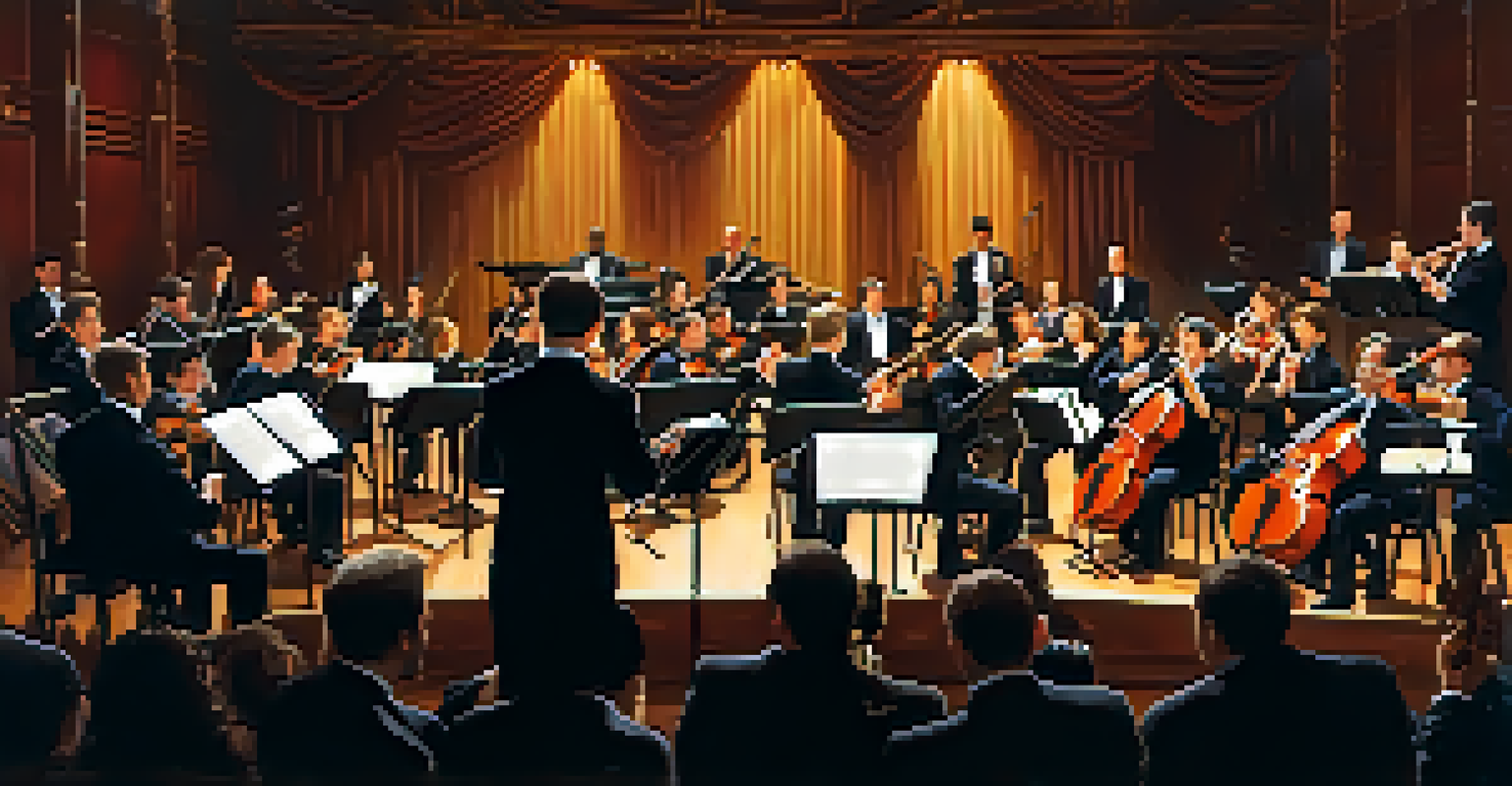The Role of Melody in Enhancing Film Narrative and Emotion

Understanding Melody's Role in Film
Melody serves as the backbone of a film's emotional landscape, guiding viewers through the narrative. Think of it as the heartbeat of a story; without it, the visuals can feel flat and disconnected. Just like a good book uses language to evoke feelings, film uses melody to enhance the emotional response of its audience.
Music can change the world because it can change people.
When a character experiences joy, the melody often reflects that through uplifting notes and harmonies. Conversely, during moments of sadness or tension, a slower, minor key melody can resonate deeply, pulling the audience into the character's experience. This interplay of sound and emotion is what makes melodies in films so powerful.
Ultimately, melody isn't just background music; it’s a pivotal component of storytelling. It helps establish mood, builds tension, and can even foreshadow events. Understanding this role allows filmmakers to craft a more immersive experience for viewers.
Creating Emotional Connections through Melody
Melody can create a profound emotional connection between the film and the audience. When a particular tune plays during a critical moment, it can evoke memories or feelings that resonate with viewers on a personal level. This is often why certain scores become iconic and are immediately associated with specific scenes or emotions.

For example, think about the haunting melody in a classic romance film. That simple tune can make the audience feel the weight of love, longing, and even heartbreak, creating a visceral connection to the characters. This emotional tie is what can linger with viewers long after the film ends.
Melody Shapes Emotional Experiences
Melody serves as the emotional backbone of a film, enhancing viewer engagement through its ability to reflect and amplify the narrative.
Furthermore, composers often use motifs—short, recurring melodies that represent characters or themes—to deepen this connection. When viewers hear a motif associated with a beloved character, it can trigger nostalgia and heighten emotional stakes, making the storytelling experience even richer.
Setting the Scene with Melody
Melody is crucial for establishing the setting and tone of a film right from the opening scene. A bright, cheerful melody can signal a light-hearted comedy, while a dark, brooding score might suggest a thriller or horror film. This immediate cue prepares the audience for what to expect, guiding their emotional response.
The music is not in the notes, but in the silence between.
Moreover, the choice of instruments can also influence the atmosphere. For instance, a piano might evoke intimacy, while a full orchestra can create grandeur and epic scope. These musical elements help paint a vivid picture of the film's world, enhancing the overall narrative.
By carefully selecting melodies that align with the setting, filmmakers can create a cohesive experience. This synergy between visual storytelling and melodic composition helps immerse the audience deeper into the film's universe.
Melody and Character Development
In film, melody can play a significant role in character development, often reflecting a character's inner journey. A character's theme can evolve throughout the film, mirroring their growth or decline. For instance, a heroic character might start with a bold melody that transforms into a more complex, layered composition as their story unfolds.
This musical evolution not only highlights a character's transformation but also enables viewers to connect emotionally with their journey. When audiences hear a character's theme in different contexts, they can feel the weight of their experiences, whether it's triumph, despair, or redemption.
Foreshadowing Through Music
Composers utilize melody to foreshadow events, creating anticipation and adding layers to the storytelling experience.
By intertwining melody with character arcs, filmmakers can create a richer narrative tapestry. This relationship between music and character adds depth to the storytelling, allowing viewers to engage more fully with the film.
Foreshadowing and Melody: A Subtle Art
Foreshadowing is a powerful storytelling device, and melody can be a subtle yet effective tool for this purpose. Composers often weave hints of future events into the score, using specific melodies to cue audiences into what’s to come. This technique can create a sense of anticipation and tension, enhancing the viewing experience.
For instance, a melody that appears during a moment of calm can later resurface in a suspenseful scene, signaling that danger is near. This clever use of music not only keeps the audience engaged but also adds layers to the narrative, making the eventual revelation more impactful.
By integrating foreshadowing through melody, filmmakers can create a richer, more complex story. It encourages viewers to pay attention to the subtleties of the score, enhancing their overall appreciation of the film.
Melody's Influence on Pacing and Rhythm
Melody significantly impacts the pacing and rhythm of a film, shaping how the audience experiences the flow of the narrative. A fast-paced, upbeat melody can quicken the tempo of a scene, creating a sense of urgency or excitement. In contrast, a slow, lingering melody can stretch out time, drawing out tension or emphasizing a moment of reflection.
This manipulation of pacing through music allows filmmakers to control the viewer's emotional journey. For example, during an action sequence, a relentless melody can keep audiences on the edge of their seats, while a softer, slower tune might encourage them to take a breath and reflect.
Melody Influences Pacing and Tone
The rhythm and tempo of melodies significantly impact the pacing of scenes, guiding audience emotions and enhancing the overall narrative flow.
By understanding how melody influences pacing, filmmakers can craft a more dynamic and engaging storytelling experience. This synergy ensures that audiences feel the intended emotions at the right moments, enhancing the overall impact of the film.
The Lasting Legacy of Film Melodies
The melodies composed for films often leave a lasting legacy, becoming cultural touchstones that resonate with audiences for years to come. Iconic scores can evoke nostalgia, transporting viewers back to the emotions they felt during key moments. This enduring connection showcases the profound impact that melody has on film narrative and emotion.
Consider how many people can hum the theme from their favorite movies. These melodies become part of our shared cultural fabric, transcending the screen and entering our lives. They serve as reminders of the stories we love and the feelings they evoke.

Ultimately, the legacy of a film's melody reflects its power to shape not just the narrative, but also the emotional experiences of its audience. As long as films are made, the role of melody will remain an essential part of storytelling, continuing to touch hearts and minds.